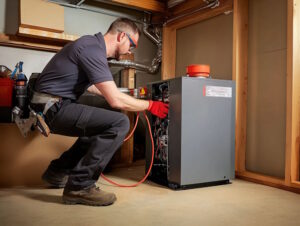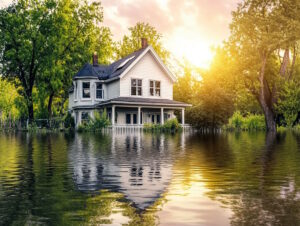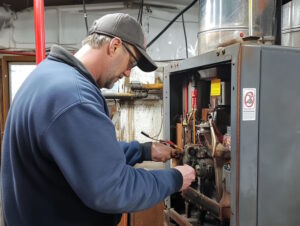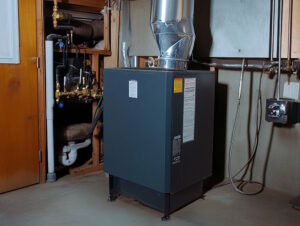As a homeowner or landlord, it’s up to you to maintain your home and property. You are in charge of keeping your home safe and up to code, and you must do everything you can to ensure your residents have adequate heat, water, and electricity.
Because others trust you do maintain the home, you’ve taken it upon yourself to do more than the bare minimum. You go out of your way to solve problems, whether they’re as simple as a clogged toilet or as complex as installing a new entertainment system.
While your do-it-yourself attitude is commendable, don’t forget that some tasks are best left to the professionals. Unless you have the tools and experience for the job, you may end up damaging your home in your attempt to fix it.
Check out our Winnipeg Plumbing Services page to see if we can help with your plumbing needs.
As you perform regular upkeep, make sure that you don’t slip into these common plumbing mistakes.
Mistake 1: You Rely on Chemical Drain Cleaners
When your kitchen drain clogs, you might be tempted to reach for that liquid drain cleaner you keep under the sink. According to the advertisements, the cleaner can knock out stubborn clogs and leave your pipes looking brand new. All you have to do is dump it down the sink and you’re good to go.
But don’t believe everything you read.
Chemical drain cleaners often contain acids strong enough to dissolve congealed grease and other materials that sit in your pipes. These same acids are capable of softening the polyvinyl chloride (PVC) pipes in your home, leaving your plumbing vulnerable to leaks.
Additionally, these chemical drain cleaners are extremely toxic, and they can burn eyes and skin if you’re not careful. If you must use chemical drain cleaners, always read the directions carefully and never use more than the recommended amount.
Mistake 2: You Use the Garden Hose to Flush Your Pipes
You love your garden hose and use it for just about everything. Have a dirty window on the second floor? No problem. Need to wash your car in a hurry? Piece of cake.
Have a clogged bathtub drain? Hold your horses!
While your garden hose can produce a great deal of water pressure, you should never use the hose to flush your pipes. The extra pressure only pushes the clog further into the pipes rather than breaking up or removing the debris. And the force of the water will put unnecessary strain on your pipes.
Leave your hose outside where it belongs, and let a plumber handle more stubborn clogs.
Mistake 3: You Bend a Coat Hanger to Unclog Your Drains
Perhaps a garden hose seems like an extreme method to unclog a drain. Maybe you prefer to grab whatever tools you have on hand to handle small fixes around the house.
If you have a particularly troublesome hairball lodged in your bathtub drain, you might simply grab the nearest coat hanger and shape it into a hook. The long, thin piece of metal slides easily into the drain, and you bet that if you could jiggle the wire into the clog that you could pull it out without any fuss.
Stop!
Don’t take this technique any further. If your coat hanger has a hook on the end to catch a clog, it can just as easily catch on the joints of your pipes. Then you’ll have a coat hanger and a clog stuck in your drain, which will be more difficult to fix. If you try to yank out the wire, you could damage smaller parts of your drain.
Mistake 4: You Set Your Water Heater Temperature Too High
Large families go through a lot of hot water. Countless loads of laundry and dishes in combination with frequent showers mean that someone will likely have to bathe in the cold. Simply turning up your water heater temperature could potentially solve the problem: more heat means more hot water however keep in mind that having your hot water tank set to high can also reduce its life expectancy.
But cranking up the temperature on your water heater is not the ideal solution, as it causes more problems than it solves. Higher water temperatures increase the risk of scalding. According to the Canada Safety Council, hot tap water accounts for 7 percent of scalding injuries, and children under five sustained 75 percent of those injuries.
If your family needs more hot water, hire a plumber to install a larger water heater tank.
Mistake 5: You Wait to Call Your Plumber
If you have a slow, leaky faucet, or a constantly running toilet, you might not think that they’re a big deal. After all, they still work (to some extent), so you don’t need to rush to call a plumber for help. You’ll figure out the problem on your own, or maybe you inwardly hope that the problem resolves itself after a while.
However, ignoring a small problem now can result in much larger costs later. For example, the average toilet uses about a gallon of water per minute when it runs. If left unchecked, it could total to 1,440 gallons a day. In addition to having a negative impact on the environment, that leaky toilet could cost hundreds of dollars in utilities each month.
If you have any plumbing emergency, big or small, don’t hesitate to call a plumber for help.







